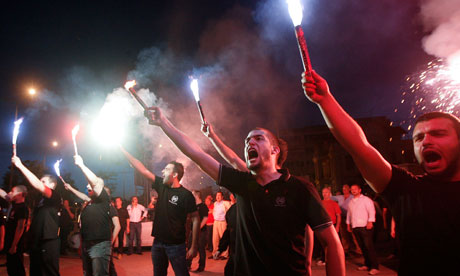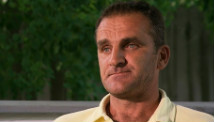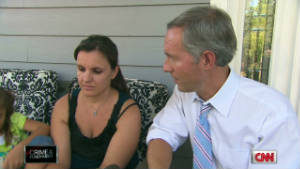Uncertainty seen after French, Greek elections

A
woman passes in front of chart with the stock prices at the Greek Stock
Exchange in Athens, Monday, May 7, 2012. (AP / Thanassis Stavrakis)
Updated: Mon May. 07 2012 12:01:47
CTVNews.ca Staff
Key elections in France and Greece sparked more worries about
Europe's ability to handle the burgeoning debt crisis, leaving
investors concerned about the stability of the European economy.
The main stock exchange in Athens closed down 6.7 per cent alone on
Monday, after falling 8 per cent -- its biggest drop since October 2008
-- earlier in the day.
Meanwhile, Eurozone shares recovered from year lows following a
knee-jerk reaction to the election results. Still the German stock
exchange was lower while the French stock exchange tip-toed into
positive territory. The London Stock Exchange was closed on Monday.
The Athens exchange tumbled after Greece's two main political
parties failed to win a combined majority as voters backed
anti-austerity parties.
The country, which has already received much financial aid and
bailouts from other countries, faces another election within two months
if it cannot form a majority government.
Greece is in the fifth year of recession and has more than half its
youth out of work following big spending cuts and tax increases in
return for crucial international bailout funds.
Colin Cieszynski, a market analyst at CMC Markets in Toronto, said
the Greek vote adds another layer of uncertainty to an already volatile
situation.
"There is nobody in charge so who do you negotiate with and what are
the policies going to be going forward?" he told CTV News Channel.
"What we are really looking at in terms of uncertainty going forward
is what will the next round be like? Will the next round of austerity
measures go through or will they have to come up with some sort of
balance between growth and austerity?"
Markets were also roiled after French socialist candidate Francois
Hollande defeated President Nicolas Sarkozy in a narrow vote Sunday.
Hollande campaigned on the need for more growth-generating economic
policies and less reliance on austerity.
"Austerity can no longer be inevitable!" Hollande declared in his victory speech.
Pundits, noting that Hollande also campaigned on a platform for
change, suggested that change is exactly what France and the rest of
Europe could experience.
Matthias Matthijs, a professor at American University, said
Hollande's election could be considered a "very important vote" given
that leaders in Spain and Italy want more emphasis on growth and
structural reform as well.
"I think we might have more orienting of the European story towards
more growth and less aggressive cutting," he told CTV News. "I think in
that sense it is a very important vote."
Despite the election setbacks, world leaders vowed to work with the new French government.
The White House said President Barack Obama called Hollande after the results were announced.
"President Obama indicated that he looks forward to working closely
with Mr. Hollande and his government on a range of shared economic and
security challenges," the U.S. said in a statement.
"President Obama noted that he will welcome President-elect Hollande
to Camp David for the G-8 Summit and to Chicago for the NATO Summit
later this month, and proposed that they meet beforehand at the White
House."
Meanwhile, Germany vowed to continue its co-operation with France to
maintain European Union policies. Chancellor Angela Merkel spoke with
Hollande for the first time on Monday.
"We said we will work well and intensively together," she told
reporters. Merkel has invited Hollande to come to Germany after his
inauguration.
However, Merkel cautioned against hopes that the austerity measures
already agreed by European leaders could now be renegotiated.
"We in Germany, and I personally, believe the fiscal pact is not up for negotiation," she said.
Canadian Minister Stephen Harper also called Hollande Sunday to express his desire to work closely with France.
With files from the Associated Press















 A
woman passes in front of chart with the stock prices at the Greek Stock
Exchange in Athens, Monday, May 7, 2012. (AP / Thanassis Stavrakis)
A
woman passes in front of chart with the stock prices at the Greek Stock
Exchange in Athens, Monday, May 7, 2012. (AP / Thanassis Stavrakis)